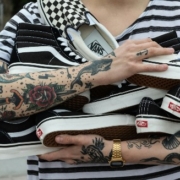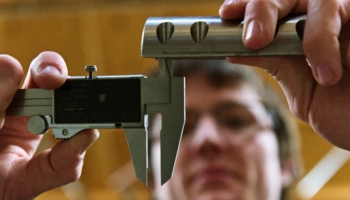What in the World Is Going On at VF Corporation?
Two plus two equals three at Denver’s influential apparel House of Brands
A year ago, I forecast tough sledding for VF Corporation, Denver’s multi-billion-dollar apparel and outdoor industry amalgam. The headwinds buffeting most consumer-brand importers were transparent enough then and remain so today; among them are supply-chain disruptions that have turned inventory management into a guessing game.
But the earnings wreckage at VF Corp reported last week by the Denver Business Journal – a “$42.4 million loss in its fiscal third quarter on sales revenue that dropped 16% year over year to $2.96 billion,” ending in December last year and including the crucial holiday shopping period – has shaken the company and compelled CEO Bracken Darrell to, well, spread the blame. The most recent casualty was the messenger: Bracken showed the door to longtime CFO Matt Puckett after a broad purge that also included “a new top human resources executive… a new lead for the company’s commercial efforts, a new head of design…a new Timberland brand president,” and others in support of “new leadership” at other VF brands.
What’s unclear is whether any of the other reported personnel moves or other cash-saving tactics, like divesting in corporate jets and real estate, will improve the outlook for VF’s corporate collective. Not that its portfolio is lacking: Vans, Dickies, North Face, Timberland, and others, are singular, compelling brands that have manifested the emotional connection with customers that brand-builders pine for. Darrell acknowledged as much in admitting that Vans, down 28% year over year after a pre-pandemic boom, had been left to trade on past success. “We actually took our eye off the core youth audience that built our brand,” he said.
Darrell’s mea culpa may not be enough. Reuters reports this week that “a member of the founding family behind VF Corp is backing activist investor Engaged Capital’s push for board seats and faster change at the struggling owner of the North Face, Vans and Timberland brands.” VF’s share price soared. Darrell’s stock will hopefully follow.
Success will likely take more than cutting people and properties – the standard “turnaround” playbook. For one, forecasting a consumer business today is really hard; uncertainty is the operating norm. Steven Sashen, co-founder and CEO of Denver-based XERO Shoes, told me in a phone interview, “I don’t think anyone knows what the hell is going on. And if your entire story is based on growth, it’s a fool’s game – especially in the footwear industry, where there’s so many things that impact business that have nothing to do with you.”
Sashen cites footwear phenom Hoka as an example. “Hoka became really, really popular in the last few years, not because it became the running shoe everybody wants to wear or to run in, but because a whole other universe of (lifestyle) buyers suddenly embraced it.”
Reason number two: the more that brands (and holding companies) focus on financial decisions, on EBITDA growth, the farther away they travel from what Sashen calls “brand DNA.”
“When VF Corp made the move to Denver, there were a number of those brands that didn’t want to move, believing that it would be a challenge just to manage the human factor and other brand-related factors,” Sashen says. “Take Altra, a brand I’m most familiar with. They’ve dramatically changed the DNA of that product.”
“Unfortunately,” Sashen continues, “companies see what’s happened through network effects, things that happen almost accidently, and their response becomes fundamentally based on financial goals that may be antithetical to what is beneficial for the brand, let alone a ‘house of brands.’”
Bracken Darrell’s roundabout acknowledgment of an existential threat to Vans – a consummate brand – may signal that not everything at VF Corp starts with share price. A founder rejoining the board might also have a positive effect on the company’s relationship with customers. Founders are invariably tuned in to things that define what a brand or business stands for. It seems that parts of Darrell’s business have lost that connection.
Darrell would also do well to revisit the company’s brand promises. “LIFESTYLES. NOT LABELS,” VF’s website proclaims. “Our iconic brands are more than just labels. Each one is uniquely authentic and has earned its place in the lives of millions by consistently exceeding their expectations with amazing products that enable them to live sustainable and active lifestyles.”
Every aspect of the respective Jansport, Smartwool, Dickies, and Timberland businesses were at one time interrelated with the others. Design, manufacturing, packaging, selling, and distribution all happened with a purpose and trajectory that led somewhere. Today, the ethos, the vibe, the adventure embodied in the products, seem lost in offshore manufacturing, in container ships, in the ever-more-slim margins that importers like VF Corp manage. Rumors of a new 60% inbound tariff don’t help.
My take on this? Keep your promises. Lean into your brands, to what makes them uniquely authentic. Customers will respond. And for a house of brands like VF Corporation, two plus two can again equal five.
Bart Taylor is a BDE at Moss Adams, and founder and former publisher of CompanyWeek manufacturing Media. Reach him at bart.taylor@mossadams.com.
XERO Shoes is finding success with an ever-expanding, direct-to-consumer line of “minimalist” footwear. Visit them at www.xeroshoes.com.



